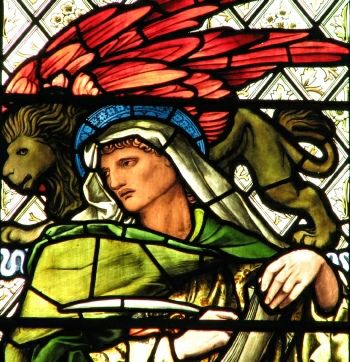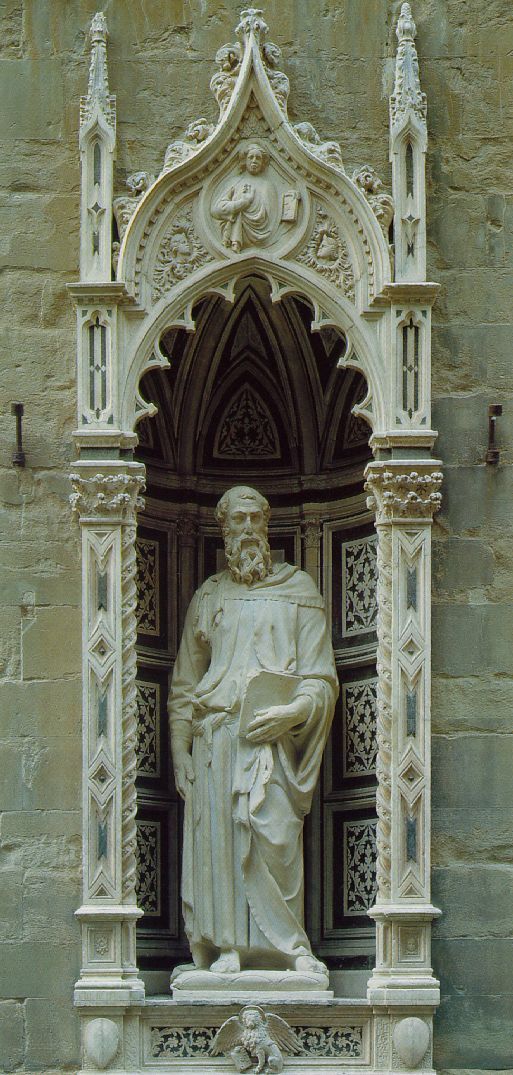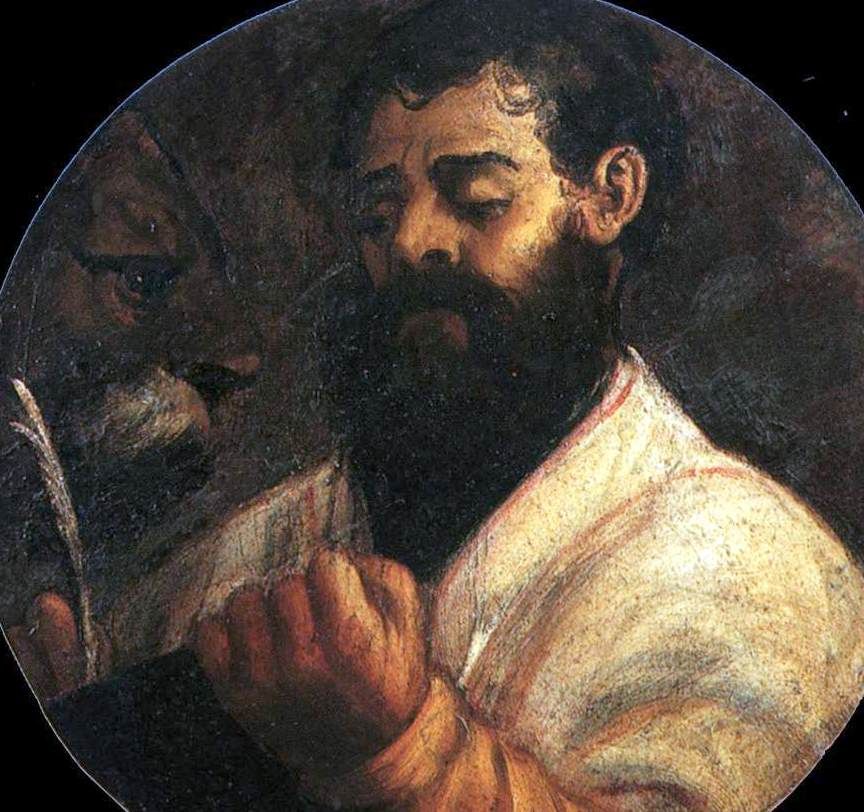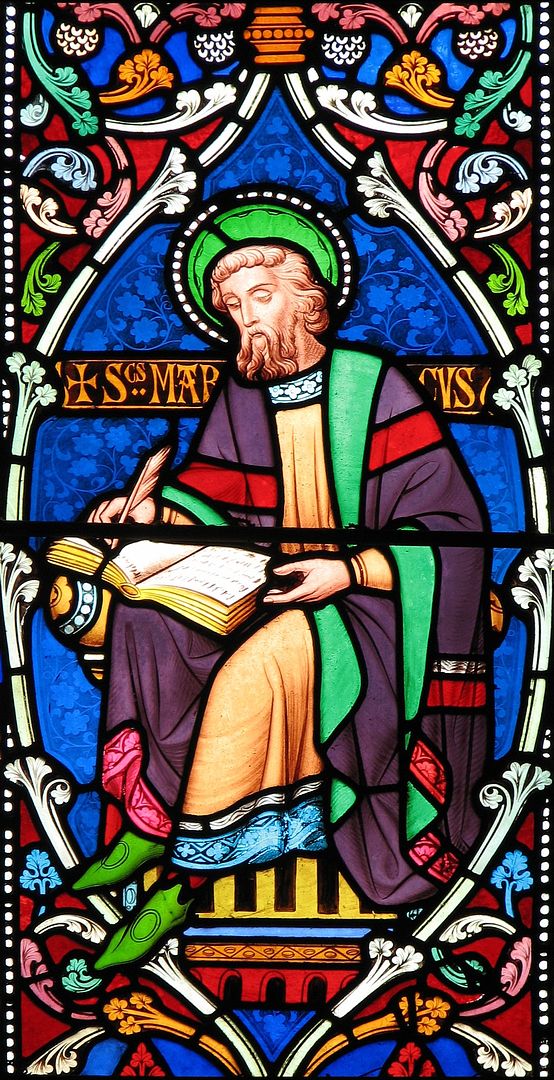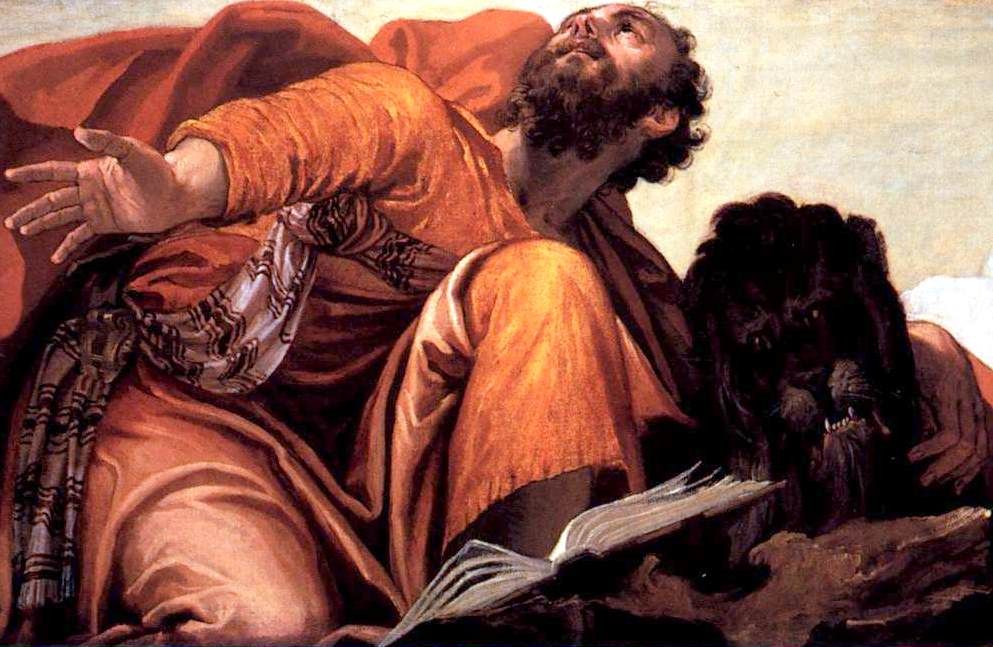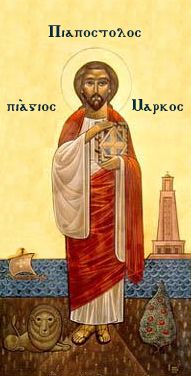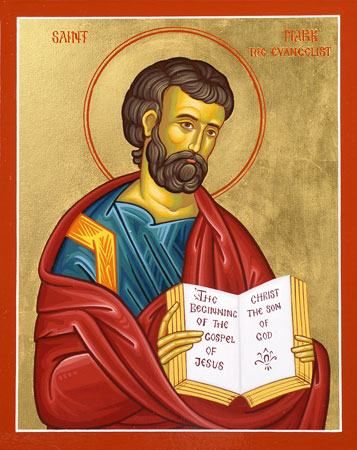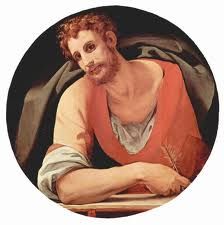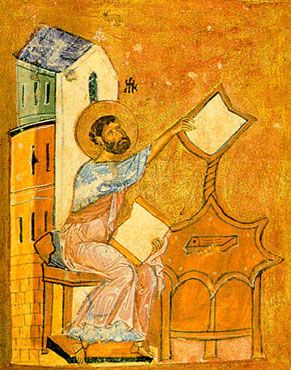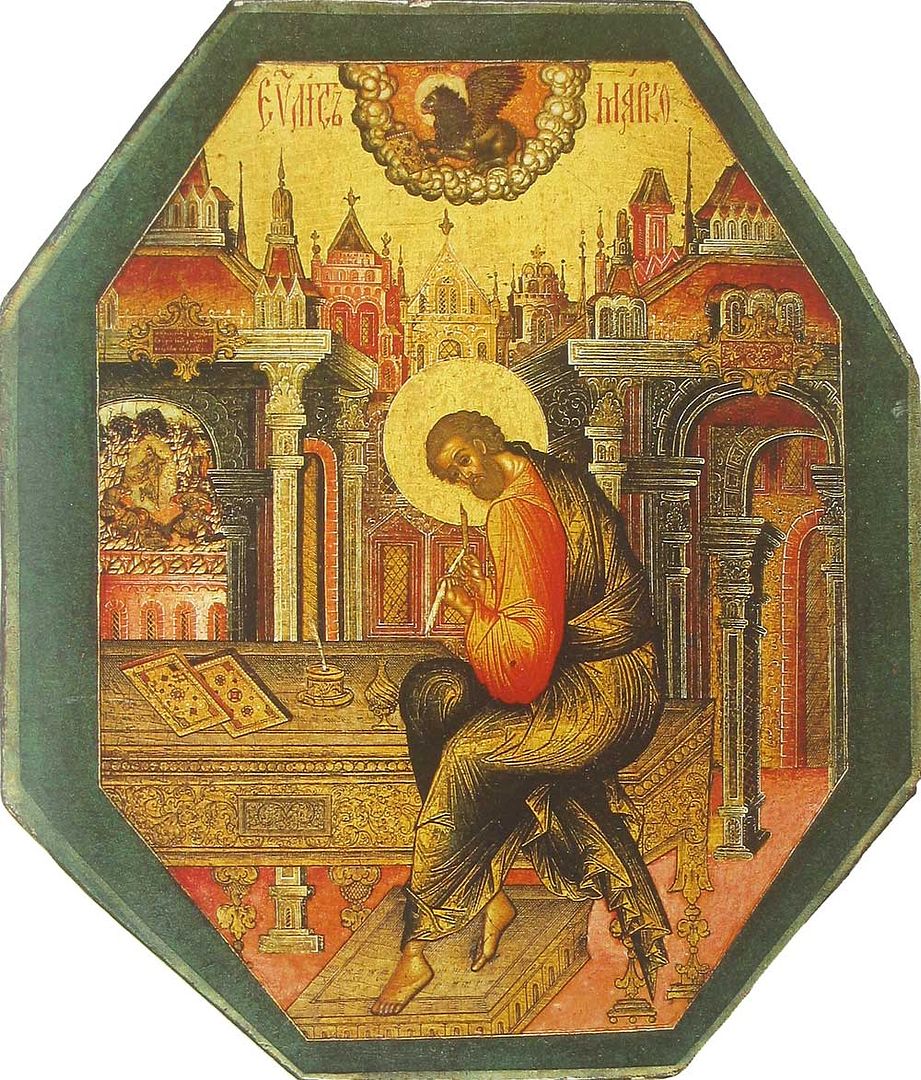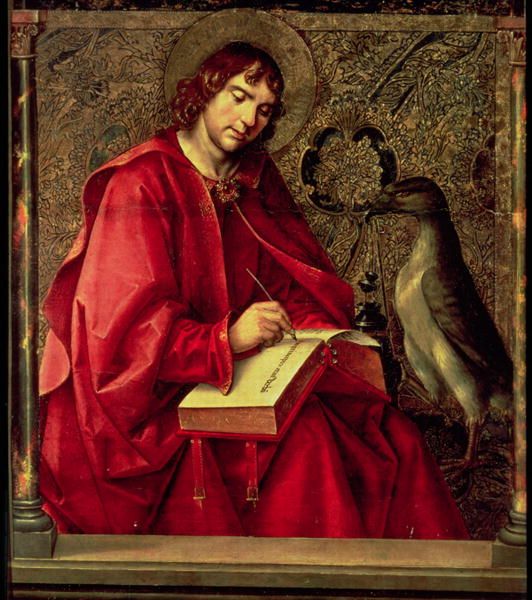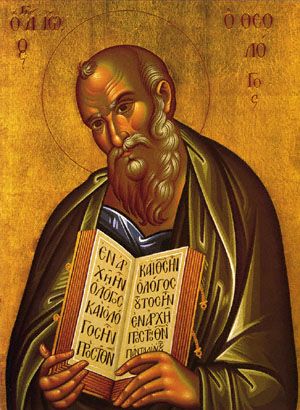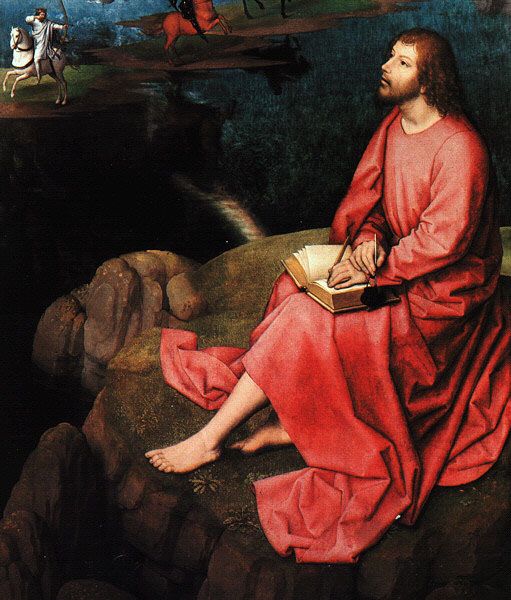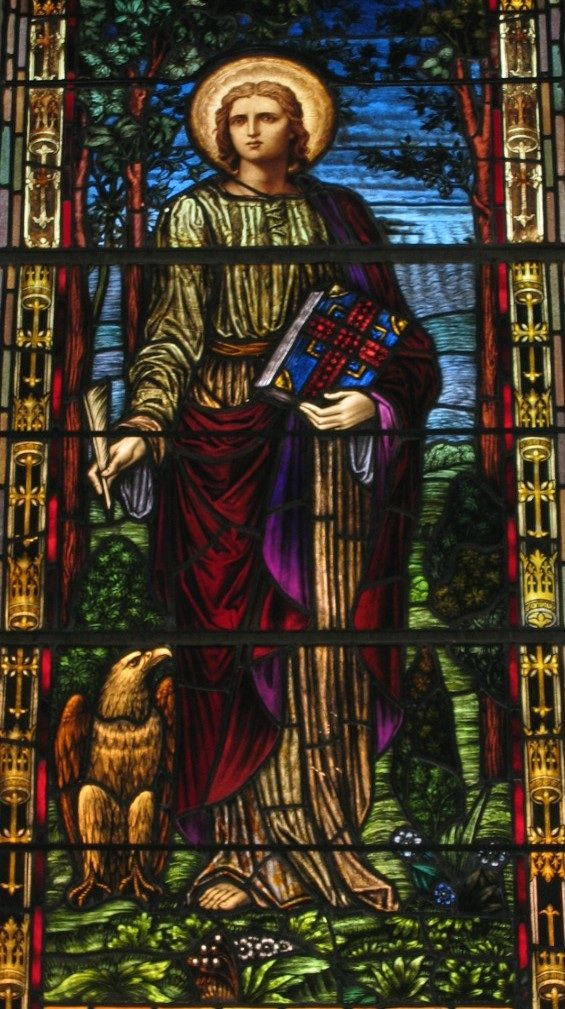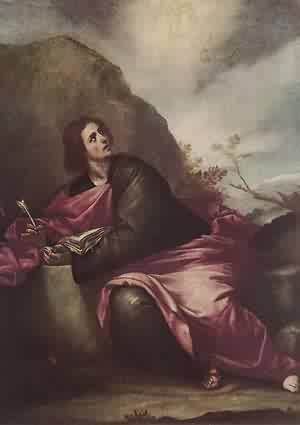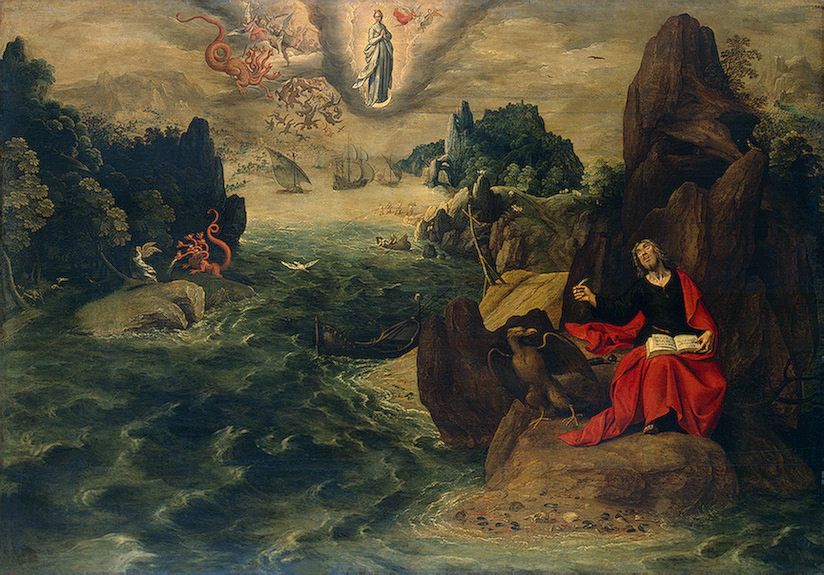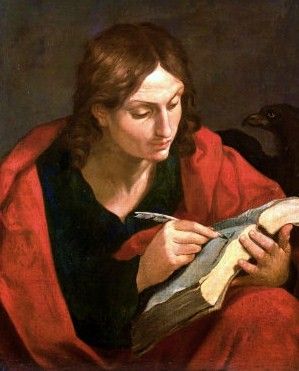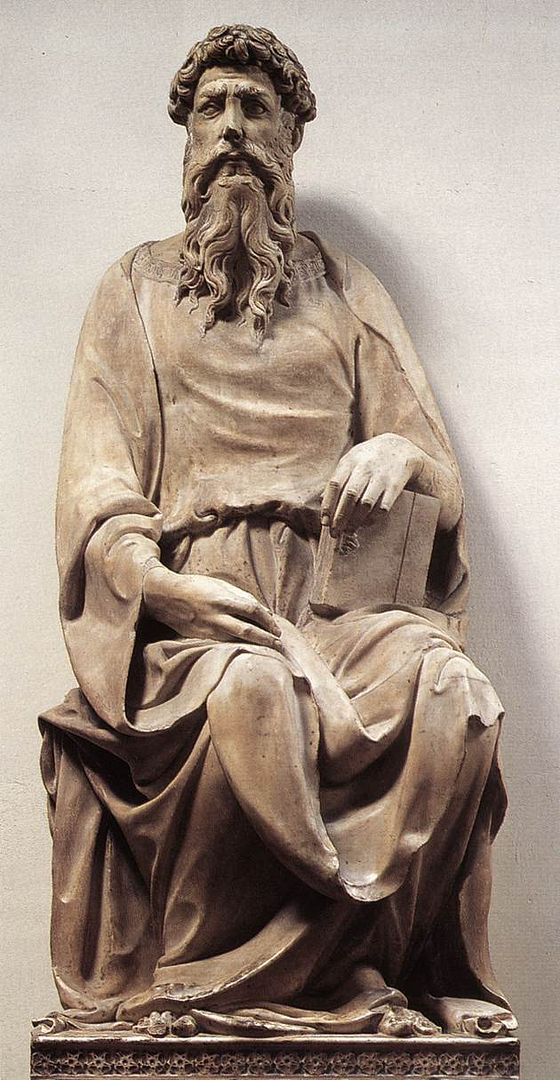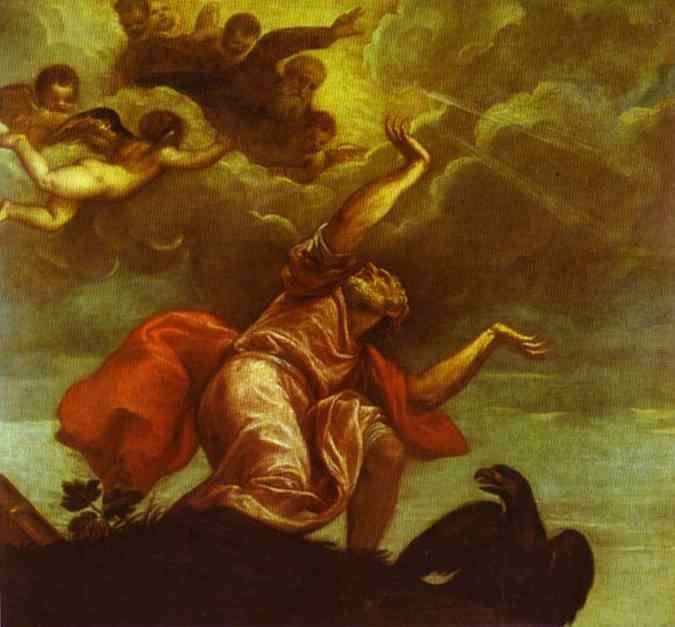Today, April 25, we celebrate the feast of Saint Mark (died 57), writer of the Gospel, martyr, and follower of Jesus. Mark, and his family, were among the first Christians of the early Church. His mother, Mary, was one of the women who followed Jesus. Mark was present at the wedding in Cana, tasting the water turned into wine. He is likewise believed to be the young man who carried the pitcher signaling that his home would be used for the Last Supper. Later, that same room housed the disciples when the Holy Spirit descended at Pentecost. On this, the dawning of the Easter season, we look to the courageous life of this saint and writer, as inspiration for our Easter journey.
Born into the tribe of Levi, Mark was born in Northern Africa (Gyrene, in modern-day Libya), in the small village of Aberyatolos. As a young Levite, he received a thorough education and was able to read and write multiple languages—a skill he would utilize to its full potential as a preacher and writer. His family moved to Palestine following unrest in Northern Africa, and there he encountered Jesus and His disciples.
Given his mother’s affiliation and following of Christ, the family was held in high esteem in early Christian circles. Often, many would meet to pray and preach in their home, and Biblical scholars posit family connections to both Saint Thomas and Saint Peter. In fact, when Saint Peter was freed from prison he went directly to the house of Mark. It is believed that Peter himself converted Mark to the faith, and following the Ascension of Jesus, Mark accompanied Peter on his subsequent missionary trips.
History tells us that Mark’s first convert was his father, who while allowing his wife to become Christian, had resisted the call himself. While traveling with his father to Jordan, the two men were set upon by a hungry lion and lioness. Mark appealed to Christ, praying, “Oh Christ, Save us!” The lions immediately departed, and his father accepted the faith. To this day, the winged lion is considered the symbol of Saint Mark.
Mark accompanied Saint Peter to Rome, likely acting as a secretary and interpreter, and is said to have later preached the Gospel in Venice and Aquila. To this day, the citizens of Venice proclaim Saint Mark as their father of faith, and the most famous of Basilicas in that city is named in his honor.
When Saint Peter wrote his First Epistle to the churches of Asia, he affectionately joined to his own salutation that of his faithful companion, whom he calls “my son Mark.” The Roman people entreated Saint Mark to put in writing for them the substance of Saint Peter’s frequent discourses on Our Lord’s life. This the Evangelist did under the eye and with the express sanction of the Apostle, and every page of his brief but graphic Gospel so bore the impress of Saint Peter’s character, that the Fathers used to name it “Peter’s Gospel.”
Saint Mark traveled subsequently throughout Lebanon, reaching Mount Lebanon, and serving as the first Bishop of Gobayel. He then journeyed to Alexandria, and is considered the father of the Egyptian Church and the theological school of Alexandria. This school became the center of Christian learning and culture for several centuries.
Holy legend tells us that Saint Mark was martyred in Alexandria around the year 57. He was dragged behind a team of oxen, with a rope around his neck, until his holy death. His relics were translated to Venice in 466, although the Italian government returned many of the relics to Egypt in the mid 1900s.
Saint Mark was graced with the gift of writing. Through his Gospels, we are revealed many of the small details of the life of Jesus—His words and actions—that other Gospel writers did not record. As his Gospel, the second Gospel, is a vivid retelling of Saint Peter’s recollections, we can be certain that these writings are the intimate and personal reflections of the first pope. The life and service of Saint Mark—as well as the legacy of discipleship and learning he left in Egypt—remind us that we each are called to play our part in the fullness of the Resurrection. What is the Risen Lord calling you to do today?
Almighty God, who by the hand of Mark the evangelist hast given to thy Church the Gospel of Jesus Christ the Son of God: We thank thee for this witness, and pray that we may be firmly grounded in its truth; through the same Jesus Christ our Lord, who liveth and reigneth with thee and the Holy Spirit, one God, for ever and ever. Amen.
O Almighty God, who hast instructed thy holy Church with the heavenly doctrines of thy Evangelist Saint Mark; Give us grace, that, being not like children carried away with every blast of vain doctrine, we may be established in the truth of thy holy Gospel; through Jesus Christ our Lord. Amen.
Year 2: Day 115 of 365
Prayer Intentions: For the Church, that we each play our part.
Requested Intentions: Freedom from addiction (J); Successful transplant surgery (K); Healing for a daughter (T); Acceptance into school (V); Successful immigration; for a sister’s career and marriage (F); Financial recovery; Successful ministry (A); Financial ability to send children to school (S); Safe return of a runaway (J); Healing of a family (J); Reconciliation of marriage (S); Healing of a daughter with congenital heart disease (F); Healing and an end to suffering (J); For the children (M); For a son fighting a rare immune system disease (R); Freedom from imprisonment (J); Employment and end to depression (H); Successful employment (A); Health for a soon to be delivered baby (T); Financial security (L); Healing of tooth pain (A); Health of expectant mother and child (R); Purification of the souls in Purgatory (A); Guidance in studies (J); Healing and security for a displaced family (C); Healing of high blood pressure; Recovery of brother following surgery (A); For a sister in trouble, that she may make better decisions in the light of Christ (M); Health of expectant mother and child (R); Attainment of funds for surgery (J).
Why pray the Rosary every day for a year?
Each time the Blessed Virgin has appeared-- whether it be to Saint Bernadette Soubirous at Lourdes; to Lucia, Jacinta, and Francisco at Fatima; or to Mariette Beco at Banneux-- she has asserted the importance, saving grace, and power of praying the Holy Rosary on a daily basis. Based upon her words, the Rosary is penance and conversion for sinners, a pathway to peace, an end to war, and a powerful act of faith in Jesus Christ. Pope Paul VI presented the Rosary as a powerful means to reach Christ "not merely with Mary but indeed, insofar as this is possible to us, in the same way as Mary, who is certainly the one who thought about Him more than anyone else has ever done."
To show us how this is done, perhaps no one has been more eloquent than the great Cardinal Newman, who wrote: "The great power of the Rosary consists in the fact that it translates the Creed into Prayer. Of course, the Creed is already in a certain sense a prayer and a great act of homage towards God, but the Rosary brings us to meditate again on the great truth of His life and death, and brings this truth close to our hearts. Even Christians, although they know God, usually fear rather than love Him. The strength of the Rosary lies in the particular manner in which it considers these mysteries, since all our thinking about Christ is intertwined with the thought of His Mother, in the relations between Mother and Son; the Holy Family is presented to us, the home in which God lived His infinite love."
As Mary said at Fatima, "Jesus wants to use you to make Me known and loved. He wishes to establish the devotion to My Immaculate Heart throughout the world. I promise salvation to whoever embraces it; these souls will be dear to God, like flowers put by Me to adorn his throne."

Today, December 27, we the feast day of Saint John the Evangelist (died 101), the Beloved Disciple of Jesus, also known as the Disciple of Charity. Saint John preached a message of love and service to one another, a lesson he learned directly from Jesus. He persistently emphasized his followers, and still today, us, to “love one another.” It is the basis of the Christian faith: “The way we came to know love was that he laid down his life for us; so we ought to lay down our lives for our brothers” (1 John 3:16)
Saint Augustine wrote extensively on the themes of love, life, and fellowship that underscore the Gospel of John. Here, the third of three excerpts from the writings of Saint Augustine on the Gospel of Saint John: “The Perfection of Love: The Example of Christ’s Death.”
Dear brethren, the Lord has marked out for us the fullness of love that we ought to have for each other. He tells us: No one has greater love than the man who lays down his life for his friends. In these words, the Lord tells us what the perfect love we should have for one another involves. John, the evangelist who recorded them, draws the conclusion in one of his letters: As Christ laid down his life for us, so we too ought to lay down our lives for our brothers. We should indeed love one another as he loved us, he who laid down his life for us.
This is surely what we read in the Proverbs of Solomon: If you sit down to eat at the table of a ruler, observe carefully what is set before you; then stretch out your hand, knowing that you must provide the same kind of meal yourself. What is this ruler’s table if not the one at which we receive the body and blood of him who laid down his life for us? What does it mean to sit at this table if not to approach it with humility? What does it mean to observe carefully what is set before you if not to meditate devoutly on so great a gift? What does it mean to stretch out one’s hand, knowing that one must provide the same kind of meal oneself, if not what I have just said: as Christ laid down his life for us, so we in our turn ought to lay down our lives for our brothers? This is what the apostle Paul said: Christ suffered for us, leaving us an example, that we might follow in his footsteps.
This is what is meant by providing “the same kind of meal”. This is what the blessed martyrs did with such burning love. If we are to give true meaning to our celebration of their memorials, to our approaching the Lord’s table in the very banquet at which they were fed, we must, like them, provide “the same kind of meal”.
At this table of the Lord we do not commemorate the martyrs in the same way as we commemorate others who rest in peace. We do not pray for the martyrs as we pray for those others, rather, they pray for us, that we may follow in his footsteps. They practised the perfect love of which the Lord said there could be none greater. They provided “the same kind of meal” as they had themselves received at the Lord’s table.
This must not be understood as saying that we can be the Lord’s equals by bearing witness to him to the extent of shedding our blood. He had the power of laying down his life; we by contrast cannot choose the length of our lives, and we die even if it is against our will. He, by dying, destroyed death in himself; we are freed from death only in his death. His body did not see corruption; our body will see corruption and only then be clothed through him in incorruption at the end of the world. He needed no help from us in saving us; without him we can do nothing. He gave himself to us as the vine to the branches; apart from him we cannot have life.
Finally, even if brothers die for brothers, yet no martyr by shedding his blood brings forgiveness for the sins of his brothers, as Christ brought forgiveness to us. In this he gave us, not an example to imitate but a reason for rejoicing. Inasmuch, then, as they shed their blood for their brothers, the martyrs provided “the same kind of meal” as they had received at the Lord’s table. Let us then love one another as Christ also loved us and gave himself up for us.
Saint Augustine wrote extensively on the themes of love, life, and fellowship that underscore the Gospel of John. Here, the third of three excerpts from the writings of Saint Augustine on the Gospel of Saint John: “The Perfection of Love: The Example of Christ’s Death.”
Dear brethren, the Lord has marked out for us the fullness of love that we ought to have for each other. He tells us: No one has greater love than the man who lays down his life for his friends. In these words, the Lord tells us what the perfect love we should have for one another involves. John, the evangelist who recorded them, draws the conclusion in one of his letters: As Christ laid down his life for us, so we too ought to lay down our lives for our brothers. We should indeed love one another as he loved us, he who laid down his life for us.
This is surely what we read in the Proverbs of Solomon: If you sit down to eat at the table of a ruler, observe carefully what is set before you; then stretch out your hand, knowing that you must provide the same kind of meal yourself. What is this ruler’s table if not the one at which we receive the body and blood of him who laid down his life for us? What does it mean to sit at this table if not to approach it with humility? What does it mean to observe carefully what is set before you if not to meditate devoutly on so great a gift? What does it mean to stretch out one’s hand, knowing that one must provide the same kind of meal oneself, if not what I have just said: as Christ laid down his life for us, so we in our turn ought to lay down our lives for our brothers? This is what the apostle Paul said: Christ suffered for us, leaving us an example, that we might follow in his footsteps.
This is what is meant by providing “the same kind of meal”. This is what the blessed martyrs did with such burning love. If we are to give true meaning to our celebration of their memorials, to our approaching the Lord’s table in the very banquet at which they were fed, we must, like them, provide “the same kind of meal”.
At this table of the Lord we do not commemorate the martyrs in the same way as we commemorate others who rest in peace. We do not pray for the martyrs as we pray for those others, rather, they pray for us, that we may follow in his footsteps. They practised the perfect love of which the Lord said there could be none greater. They provided “the same kind of meal” as they had themselves received at the Lord’s table.
This must not be understood as saying that we can be the Lord’s equals by bearing witness to him to the extent of shedding our blood. He had the power of laying down his life; we by contrast cannot choose the length of our lives, and we die even if it is against our will. He, by dying, destroyed death in himself; we are freed from death only in his death. His body did not see corruption; our body will see corruption and only then be clothed through him in incorruption at the end of the world. He needed no help from us in saving us; without him we can do nothing. He gave himself to us as the vine to the branches; apart from him we cannot have life.
Finally, even if brothers die for brothers, yet no martyr by shedding his blood brings forgiveness for the sins of his brothers, as Christ brought forgiveness to us. In this he gave us, not an example to imitate but a reason for rejoicing. Inasmuch, then, as they shed their blood for their brothers, the martyrs provided “the same kind of meal” as they had received at the Lord’s table. Let us then love one another as Christ also loved us and gave himself up for us.
Today, December 27, we the feast day of Saint John the Evangelist (died 101), the Beloved Disciple of Jesus, also known as the Disciple of Charity. Saint John preached a message of love and service to one another, a lesson he learned directly from Jesus. He persistently emphasized his followers, and still today, us, to “love one another.” It is the basis of the Christian faith: “The way we came to know love was that he laid down his life for us; so we ought to lay down our lives for our brothers.” (1 John 3:16)
Saint Augustine wrote extensively on the themes of love, life, and fellowship that underscore the Gospel of John. Here, the first of three excerpts from the writings of Saint Augustine on the Gospel of Saint John:
Consider what is said to you: Love God. If you say to me: Show me whom I am to love, what shall I say if not what Saint John says: No one has ever seen God! But in case you should think that you are completely cut off from the sight of God, he says: God is love, and he who remains in love remains in God. Love your neighbor, then, and see within yourself the power by which you love your neighbor; there you will see God, as far as you are able.
Begin, then, to love your neighbor. Break your bread to feed the hungry, and bring into your home the homeless poor; if you see someone naked, clothe him, and do not look down on your own flesh and blood.
What will you gain by doing this? Your light will then burst forth like the dawn. Your light is your God; he is your dawn, for he will come to you when the night of time is over. He does not rise or set but remains for ever.
In loving and caring for your neighbor you are on a journey. Where are you traveling if not to the Lord God, to him whom we should love with our whole heart, our whole soul, our whole mind? We have not yet reached his presence, but we have our neighbor at our side. Support, then, this companion of your pilgrimage if you want to come into the presence of the one with whom you desire to remain for ever.
Saint Augustine wrote extensively on the themes of love, life, and fellowship that underscore the Gospel of John. Here, the first of three excerpts from the writings of Saint Augustine on the Gospel of Saint John:
Consider what is said to you: Love God. If you say to me: Show me whom I am to love, what shall I say if not what Saint John says: No one has ever seen God! But in case you should think that you are completely cut off from the sight of God, he says: God is love, and he who remains in love remains in God. Love your neighbor, then, and see within yourself the power by which you love your neighbor; there you will see God, as far as you are able.
Begin, then, to love your neighbor. Break your bread to feed the hungry, and bring into your home the homeless poor; if you see someone naked, clothe him, and do not look down on your own flesh and blood.
What will you gain by doing this? Your light will then burst forth like the dawn. Your light is your God; he is your dawn, for he will come to you when the night of time is over. He does not rise or set but remains for ever.
In loving and caring for your neighbor you are on a journey. Where are you traveling if not to the Lord God, to him whom we should love with our whole heart, our whole soul, our whole mind? We have not yet reached his presence, but we have our neighbor at our side. Support, then, this companion of your pilgrimage if you want to come into the presence of the one with whom you desire to remain for ever.
Subscribe to:
Posts (Atom)







